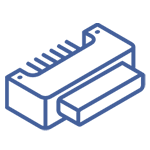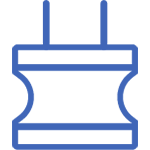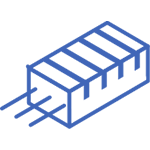

Molex 92321-1610
Manufacturer No:
92321-1610
Tiny WHSLManufacturer:
Utmel No:
1657-92321-1610
Package:
-
Description:
92321-1610 datasheet pdf and Flat Flex, Ribbon Jumper Cables product details from Molex stock available at Utmel
Quantity:
Delivery:





Payment:











In Stock : Please Inquire
Please send RFQ , we will respond immediately.
United States
China
Canada
Japan
Russia
Germany
United Kingdom
Singapore
Italy
Hong Kong(China)
Taiwan(China)
France
Korea
Mexico
Netherlands
Malaysia
Austria
Spain
Switzerland
Poland
Thailand
Vietnam
India
United Arab Emirates
Afghanistan
Åland Islands
Albania
Algeria
American Samoa
Andorra
Angola
Anguilla
Antigua & Barbuda
Argentina
Armenia
Aruba
Australia
Azerbaijan
Bahamas
Bahrain
Bangladesh
Barbados
Belarus
Belgium
Belize
Benin
Bermuda
Bhutan
Bolivia
Bonaire, Sint Eustatius and Saba
Bosnia & Herzegovina
Botswana
Brazil
British Indian Ocean Territory
British Virgin Islands
Brunei
Bulgaria
Burkina Faso
Burundi
Cabo Verde
Cambodia
Cameroon
Cayman Islands
Central African Republic
Chad
Chile
Christmas Island
Cocos (Keeling) Islands
Colombia
Comoros
Congo
Congo (DRC)
Cook Islands
Costa Rica
Côte d’Ivoire
Croatia
Cuba
Curaçao
Cyprus
Czechia
Denmark
Djibouti
Dominica
Dominican Republic
Ecuador
Egypt
El Salvador
Equatorial Guinea
Eritrea
Estonia
Eswatini
Ethiopia
Falkland Islands
Faroe Islands
Fiji
Finland
French Guiana
French Polynesia
Gabon
Gambia
Georgia
Ghana
Gibraltar
Greece
Greenland
Grenada
Guadeloupe
Guam
Guatemala
Guernsey
Guinea
Guinea-Bissau
Guyana
Haiti
Honduras
Hungary
Iceland
Indonesia
Iran
Iraq
Ireland
Isle of Man
Israel
Jamaica
Jersey
Jordan
Kazakhstan
Kenya
Kiribati
Kosovo
Kuwait
Kyrgyzstan
Laos
Latvia
Lebanon
Lesotho
Liberia
Libya
Liechtenstein
Lithuania
Luxembourg
Macao(China)
Madagascar
Malawi
Maldives
Mali
Malta
Marshall Islands
Martinique
Mauritania
Mauritius
Mayotte
Micronesia
Moldova
Monaco
Mongolia
Montenegro
Montserrat
Morocco
Mozambique
Myanmar
Namibia
Nauru
Nepal
New Caledonia
New Zealand
Nicaragua
Niger
Nigeria
Niue
Norfolk Island
North Korea
North Macedonia
Northern Mariana Islands
Norway
Oman
Pakistan
Palau
Palestinian Authority
Panama
Papua New Guinea
Paraguay
Peru
Philippines
Pitcairn Islands
Portugal
Puerto Rico
Qatar
Réunion
Romania
Rwanda
Samoa
San Marino
São Tomé & Príncipe
Saudi Arabia
Senegal
Serbia
Seychelles
Sierra Leone
Sint Maarten
Slovakia
Slovenia
Solomon Islands
Somalia
South Africa
South Sudan
Sri Lanka
St Helena, Ascension, Tristan da Cunha
St. Barthélemy
St. Kitts & Nevis
St. Lucia
St. Martin
St. Pierre & Miquelon
St. Vincent & Grenadines
Sudan
Suriname
Svalbard & Jan Mayen
Sweden
Syria
Tajikistan
Tanzania
Timor-Leste
Togo
Tokelau
Tonga
Trinidad & Tobago
Tunisia
Turkey
Turkmenistan
Turks & Caicos Islands
Tuvalu
U.S. Outlying Islands
U.S. Virgin Islands
Uganda
Ukraine
Uruguay
Uzbekistan
Vanuatu
Vatican City
Venezuela
Wallis & Futuna
Yemen
Zambia
Zimbabwe
You may place an order without registering to Utmel.
We strongly suggest you sign in before purchasing as you can track your order in real time.
For your convenience, we accept multiple payment methods in USD, including PayPal, Credit Card, and wire transfer.
RFQ (Request for Quotations)It is recommended to request for quotations to get the latest prices and inventories about the part.
Our sales will reply to your request by email within 24 hours.
1. You'll receive an order information email in your inbox. (Please remember to check the spam folder if you didn't hear from us).
2. Since inventories and prices may fluctuate to some extent, the sales manager is going to reconfirm the order and let you know if there are any updates.
- TypeParameter
- Lifecycle Status
Lifecycle Status refers to the current stage of an electronic component in its product life cycle, indicating whether it is active, obsolete, or transitioning between these states. An active status means the component is in production and available for purchase. An obsolete status indicates that the component is no longer being manufactured or supported, and manufacturers typically provide a limited time frame for support. Understanding the lifecycle status is crucial for design engineers to ensure continuity and reliability in their projects.
Obsolete (Last Updated: 2 years ago) - Conductor Material
A conductor is a material which contains movable electric charges. In metallic conductors, such as copper or aluminum, the movable charged particles are electrons, though in other cases they can be ions or other positively charged species.
Tinned Copper - EU RoHSCompliant
- ECCN (US)EAR99
- AutomotiveNo
- PPAPNo
- Size (AWG)28
- Cable Pitch (mm)1.27
- Cable Length (m)0.1
- Wire Size27 AWG
- Cable TypesRibbon
- Country of OriginPL
- Manufacturer Lifecycle StatusOBSOLETE (Last Updated: 2 years ago)
- RoHSCompliant
- PackageBox
- Base Product Number
"Base Product Number" (BPN) refers to the fundamental identifier assigned to a component by the manufacturer. This number is used to identify a specific product family or series of components that share common features, characteristics, or functionality. The BPN is usually part of a larger part number or order code that includes additional information, such as variations in packaging, tolerance, voltage ratings, and other specifications.
92321 - MfrMolex
- Product StatusActive
- Packaging
Semiconductor package is a carrier / shell used to contain and cover one or more semiconductor components or integrated circuits. The material of the shell can be metal, plastic, glass or ceramic.
Bag - Series
In electronic components, the "Series" refers to a group of products that share similar characteristics, designs, or functionalities, often produced by the same manufacturer. These components within a series typically have common specifications but may vary in terms of voltage, power, or packaging to meet different application needs. The series name helps identify and differentiate between various product lines within a manufacturer's catalog.
* - Part Status
Parts can have many statuses as they progress through the configuration, analysis, review, and approval stages.
Obsolete - Connector Type
Connector Type in electronic components refers to the specific design and configuration of the connector used to establish electrical connections between different devices or components. This parameter describes the physical shape, size, and layout of the connector, as well as the number and arrangement of pins or contacts. Common connector types include USB, HDMI, RJ45, and D-sub connectors, each serving different purposes and applications. Understanding the connector type is crucial for ensuring compatibility and proper functionality when connecting electronic devices together.
QF-50 TO QF-50 - ColorGrey
- Number of Rows2
- Gender
In the context of electronic components, the parameter "Gender" typically refers to the physical characteristics of connectors or interfaces that determine how they can be mated together. Connectors are often designed with specific gender types, such as male or female, to ensure proper alignment and connection between devices. A male connector typically has protruding pins or plugs that fit into a corresponding female connector, which has receptacles or sockets to receive the pins. This design helps prevent incorrect connections and ensures a secure and reliable electrical connection. Understanding the gender of connectors is crucial when designing or assembling electronic systems to ensure compatibility and proper functionality. It is essential to match the gender of connectors correctly to avoid damage and ensure optimal performance of the electronic components.
F-F - Current Rating
Current rating is the maximum current that a fuse will carry for an indefinite period without too much deterioration of the fuse element.
1 A - Insulation Color
Insulation color in electronic components refers to the specific coloring of the insulating material used in wires, cables, and other components. This color coding serves important functions such as indicating the function of the wire, denoting voltage levels, or providing safety information. Different colors correspond to different standards in various regions, helping users quickly identify wiring types and reduce the risk of errors in assembly or maintenance. It plays a critical role in ensuring proper usage and organization within electrical systems.
Gray - Number of Contacts16 to 16
- Lead Length
Lead length refers to the distance from the body of an electronic component to the end of its leads or terminals. It is an important specification in component design and packaging, as it affects the ease of soldering, the overall fit within a circuit board, and the electrical performance. Longer leads can facilitate easier connections but may also introduce increased resistance or inductance in high-frequency applications. Proper lead length is crucial for ensuring reliable connections and optimal performance in electronic circuits.
100 mm - Wire Gauge
a measurement of?wire?diameter.?This determines the amount of electric current the wire can safely carry, as well as its electrical resistance and weight.
27(AWG) - Number of Circuits16
- Wire/Cable Type
Wire/Cable Type refers to the specific classification or category of wire or cable used in electronic components, which determines its characteristics, such as size, material, insulation, and intended application. Common types include stranded or solid conductors, and variations like coaxial, twisted pair, and ribbon cables. Each type is designed to meet specific requirements for electrical conductivity, flexibility, durability, and resistance to environmental factors. Selecting the appropriate wire or cable type is crucial for ensuring the performance and reliability of electronic devices and systems.
Ribbon - Cable Length
A nautical unit of measure equal to one tenth of a nautical mile or approximately 1 fathoms.
0.1 m - Connector Type A
Connector Type A refers to a specific configuration and design of electrical connectors used for interfacing electronic components. It is characterized by its standardized pin layout and physical dimensions, allowing for reliable and consistent connections between devices. Commonly found in applications such as USB connections, Connector Type A ensures proper alignment and connectivity, facilitating data transfer and power supply among various electronic systems.
QF-50 - Connector Type B
Connector Type B refers to the specific type of connector used in electronic components to establish a connection between two devices or components. This parameter typically describes the physical shape, size, and configuration of the connector, as well as the method of attachment or mating with another connector. Connector Type B can vary widely depending on the application and industry, with different standards and specifications defining the characteristics of the connector. It is important to match Connector Type B correctly to ensure compatibility and proper functionality in electronic systems.
QF-50 - Cable Pitch
Cable pitch refers to the distance between the centerlines of adjacent conductors in a cable or electronic component. It is an important parameter that determines the spacing and arrangement of the conductors within the cable, which can impact signal integrity, crosstalk, and overall performance. A smaller cable pitch generally allows for higher data transmission rates and better signal quality, while a larger pitch may be more suitable for power applications where insulation and spacing are critical. Manufacturers often specify the cable pitch in their product datasheets to help users understand the design and capabilities of the component.
1.27 mm - Connector Pitch
Connector Pitch in electronic components refers to the distance between the center of one pin to the center of the adjacent pin in a connector. It is a crucial parameter that determines the spacing and alignment of pins in connectors, ensuring proper connectivity and compatibility between components. The connector pitch is typically specified in millimeters or inches and plays a significant role in determining the overall size and layout of electronic devices. Choosing the right connector pitch is essential to ensure that components can be properly connected and integrated into electronic systems.
2.54 mm - Length100 mm
- REACH SVHC
The parameter "REACH SVHC" in electronic components refers to the compliance with the Registration, Evaluation, Authorization, and Restriction of Chemicals (REACH) regulation regarding Substances of Very High Concern (SVHC). SVHCs are substances that may have serious effects on human health or the environment, and their use is regulated under REACH to ensure their safe handling and minimize their impact.Manufacturers of electronic components need to declare if their products contain any SVHCs above a certain threshold concentration and provide information on the safe use of these substances. This information allows customers to make informed decisions about the potential risks associated with using the components and take appropriate measures to mitigate any hazards.Ensuring compliance with REACH SVHC requirements is essential for electronics manufacturers to meet regulatory standards, protect human health and the environment, and maintain transparency in their supply chain. It also demonstrates a commitment to sustainability and responsible manufacturing practices in the electronics industry.
Unknown - Radiation Hardening
Radiation hardening is the process of making electronic components and circuits resistant to damage or malfunction caused by high levels of ionizing radiation, especially for environments in outer space (especially beyond the low Earth orbit), around nuclear reactors and particle accelerators, or during nuclear accidents or nuclear warfare.
No



















